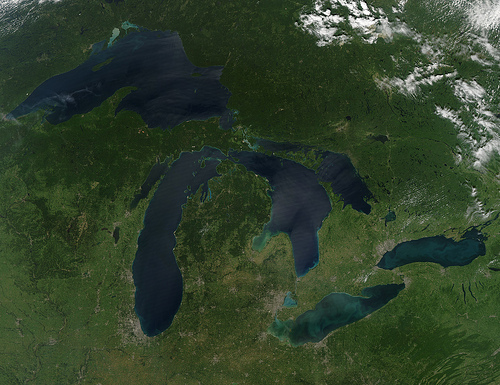Peters and Stabenow Unveil Legislation Meant to Protect Great Lakes from Oil Spill
Legislation would protect ban shipping of crude oil on the Great Lakes.

Both U.S. senators from Michigan are spearheading legislation meant to protect the Great Lakes from an oil spill.
Senators Gary Peters and Debbie Stabenow say the measures would ban shipping of crude oil on the lakes. That’s something that’s not happening now, the senators admit.
“But we know that folks are considering that as an option to move more oil on the Great Lakes with ships,” said Peters. “And that’s something that both Senator Stabenow as I feel very strongly we need to put in law to make sure that does not occur.”
The prospect of shipping crude oil on the lakes is especially likely if an aging oil pipeline under the Straits of Mackinac is shut down. The legislation stops short of calling for Enbridge Energy’s Line 5 to be shut down. It would require federal studies to find alternatives to the pipeline.
The senators say a spill in that area would be catastrophic.
“This would be a disaster from a commerce standpoint, from a tourism standpoint, a quality-of-life standpoint,” said Stabenow. “So, hopefully this is something that everyone will come together around.”
Enbridge is conducting safety drills this week near the pipeline. It says the line is safe and regularly inspected.
The legislation would also require the U.S. Coast Guard and other agencies to come up with more detailed spill clean-up response plans. This would include planning for a spill in icy winter conditions.
It would also require that residents are notified about pipelines near their property and compels operators to maintain publicly available information.
Finally, the legislation would add new criteria for defining geographical areas that require additional safety me asures for hazardous liquid pipelines. The federal Pipeline and Hazardous Materials Safety Administration (PHMSA) would have to take into account new factors when designating “high consequence areas.” New factors would including age of the pipeline, type of oil being transported, whether the pipeline can be inspected using the most modern technology, and whether the pipeline crosses open waters of the Great Lakes.
Peters sits on the Senate Commerce, Science, and Transportation Committee, which is expected to take up a reauthorization of the federal Pipeline Safety Act, which PHMSA oversees.
